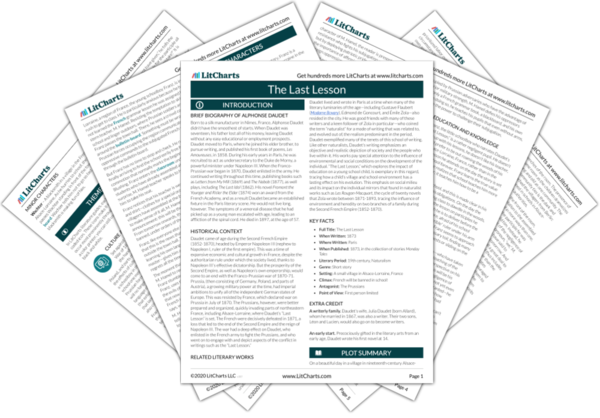The blackboard on which M. Hamel writes the words “Vive la France!” (“Long live France!”) at the end of the last lesson represents the power of patriotism and resistance. That the blackboard is located within the classroom itself alludes to the relationship between education and resistance. The blackboard represents resistance through education, and reflects the story’s broader emphasis on language and communication as tools of both liberation and oppression. The words the teacher writes on the board are words that privilege freedom and autonomy. They are a direct denial of the claims of the Prussian occupiers, who have invaded the French region of Alsace-Lorraine, where the story is set, and staked it for their own. That the teacher writes these words on the blackboard is significant, because this board recalls and contrasts with the bulletin-board Franz sees at the beginning of the story. While the bulletin-board represents the oppression of the Prussian occupiers, who post their restrictive dictates there, the blackboard functions as a space of liberation, one where M. Hamel—and the villagers—can assert their resistance and patriotism in the face of foreign invasion.
The Blackboard Quotes in The Last Lesson
All at once the church-clock struck twelve. Then the Angelus. At the same moment the trumpets of the Prussians, returning from drill, sounded under our windows. M. Hamel stood up, very pale, in his chair. I never saw him look so tall.
“My friends,” said he, “I—I—” But something choked him. He could not go on.
Then he turned to the blackboard, took a piece of chalk, and, bearing on with all his might, he wrote as large as he could—
“Vive La France!”

Unlock explanations and citation info for this and every other The Last Lesson quote.
Plus so much more...
Get LitCharts A+









